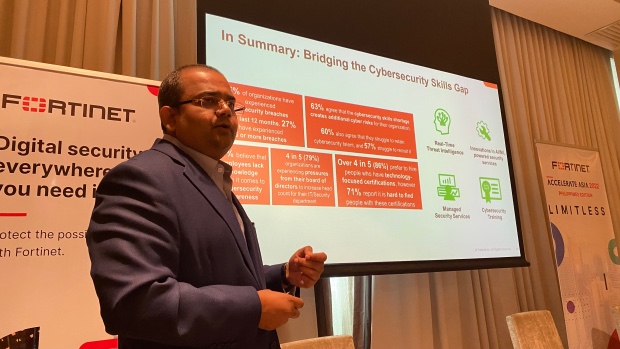As the digital landscape in the Philippines continues to evolve, a large chunk of enterprise attack incidents are still being proliferated through malicious links and attachments embedded in emails, cybersecurity firm Fortinet reported on Tuesday, May 31.

For Rashish Pandey, Fortinet Asia VP for marketing and communications, email is just one among many attack vectors that malicious actors exploit alongside operational technology, network engineering, and work-from-home setups.
As threat actors become more innovative in utilizing ‘social engineering’ tactics in luring unsuspecting end-users, Fortinet calls for enterprises to develop more comprehensive cybersecurity measures that counteract their increasing attack surface.
“It’s important to have that platform view that it’s not just one solution…it’s a solution that factors in scenarios covering a whole range of options,” Pandey explained.
During the Philippine edition of Fortinet’s annual cybersecurity conference ‘Fortinet Accelerate Asia 2022’, International Data Corporation (IDC) market analyst Angela Medez also shared the major growth drivers of the cybersecurity market today.
The four key factors affecting the spike in cybersecurity spending include the advancing of threat strategies, the growth of cloud and automation, the expansion of the threat surface, and the increasing number of protective regulations designed to safeguard consumers.
Despite this increase in demand, Fortinet said that there is a problem in the recruitment and retention in cybersecurity talent, leading to more organizational challenges directly caused by a lack of qualified cybersecurity professionals.
Based on Fortinet’s published report on the skills gap in the cybersecurity industry, the most ought-after roles are cloud security specialists, security operations analysts, and security administrators.
“In the Philippines, a lot of courses are evolving. We have very focused cybersecurity-related courses. We partnered with four, and we’re aiming to grow that to even more schools,” Fortinet Philippines country manager Louie Castaneda shared.
To help organizations adapt to the shifting cyberthreat landscape, Fortinet recently released a virtual security analyst functionality with FortiNDR, a platform that leverages on a deep neural network that investigates new threats and self-learns over time.
“We already have some customers who expressed interest…FortiNDR is actually dependent on the security operations center maturity of a specific organization,” said Napoleon Castillo, systems engineering manager at Fortinet Philippines.
He explained that the three maturity levels comes in the form of the deployment of sensors and detectors, the utilization of security incidents and events management (SIEM) that correlates the data from the sensors, and leveraging on the ability of security orchestration automation and response (SOAR) to automate the security operations center further.




